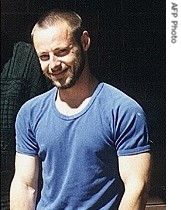2007年VOA标准英语-Australian Taleban Back Home, Behind Bars(在线收听)
Sydney
23 May 2007
The first Guantanamo Bay detainee to be convicted of terrorism is back in his home country, Australia. David Hicks, who had joined militant groups in Kosovo, Kashmir and Afghanistan, pleaded guilty to supporting extremism and now is in a maximum-security prison, serving a sentence imposed by a U.S. military court. His return has sparked considerable debate in Australia. Phil Mercer has been following the story from Sydney.
Supporters of David Hicks have portrayed him as a misguided young man when he was captured in Afghanistan. They believe his five-year detention without trial at Guantanamo Bay was unfair.
Hicks returned to Australia this week to serve a nine-month sentence at the Yatala prison in South Australia state.
His lawyer David McLeod was at the military air base in Adelaide when his client arrived home.
 |
| Handout photo received 27 March, 2007 shows undated photo of Australian David Hicks |
Hicks pleaded guilty in March to providing material support to al-Qaida, including attending terrorist training camps in Afghanistan.
Prosecutors said he tried to fight on the side of the Taleban against the U.S-led forces that invaded Afghanistan after the al-Qaida attacks on the United States in 2001.
Hicks' five years in the U.S. military prison in Cuba and the military tribunal that convicted him have been roundly criticized in Australia as violations of human rights. Among those angry over Hicks' case are former Prime Minister Malcom Fraser and many academics and rights activists.
Kevin Foley is the acting head of the South Australian state government. He acknowledges the concerns about the long pre-trial detention, but says Hicks belongs in prison.
"Notwithstanding legitimate concerns that Australians have held about the time in which Mr. Hicks was detained before receiving what can be considered any form of fair trial - very legitimate and understandable concerns and shared by many - but let's also understand and be very clear about this: David Hicks is no hero," he noted. "Mr. Hicks has confessed to aiding and abetting al-Qaida and terrorist organizations. David Hicks is a very foolish young man at best, an extremely dangerous man at worst."
Australian Attorney-General Philip Ruddock says Hicks was treated fairly. He says his government pushed U.S. authorities to deal with the case swiftly.
Ruddock has praised Hicks' lawyers, including U.S. Marine Major Michael Mori, who worked hard to have his client freed.
"One of the points I've made about that system is that the Americans treat their military justice system very seriously," Ruddock said. "It is part of their system of law. People like Major Mori participate in defending people and nobody could complain about the way in which he as a military officer - who believes in that military justice system, participated in it."
The Australian public appears split over the Hicks case.
"I thought he was treated terribly and it's good to see that he's back and he's in slightly better conditions," one woman said.
She expressed a commonly heard position here - that Hicks was made a scapegoat.
But another woman was unhappy with the attention Hicks has received.
"I don't see why the media have really just glorified him," she said. "He's been presented to us in a way that we should feel sorry for him. … It's always about him being hard done by and I really don't see why. I mean, he's a terrorist."
Hicks is due to walk free from prison on December 29.
When he is freed, the former kangaroo skinner will enter a challenging world. He probably will be under police surveillance. And he may well face continued scrutiny from the media, and a possibly hostile public.